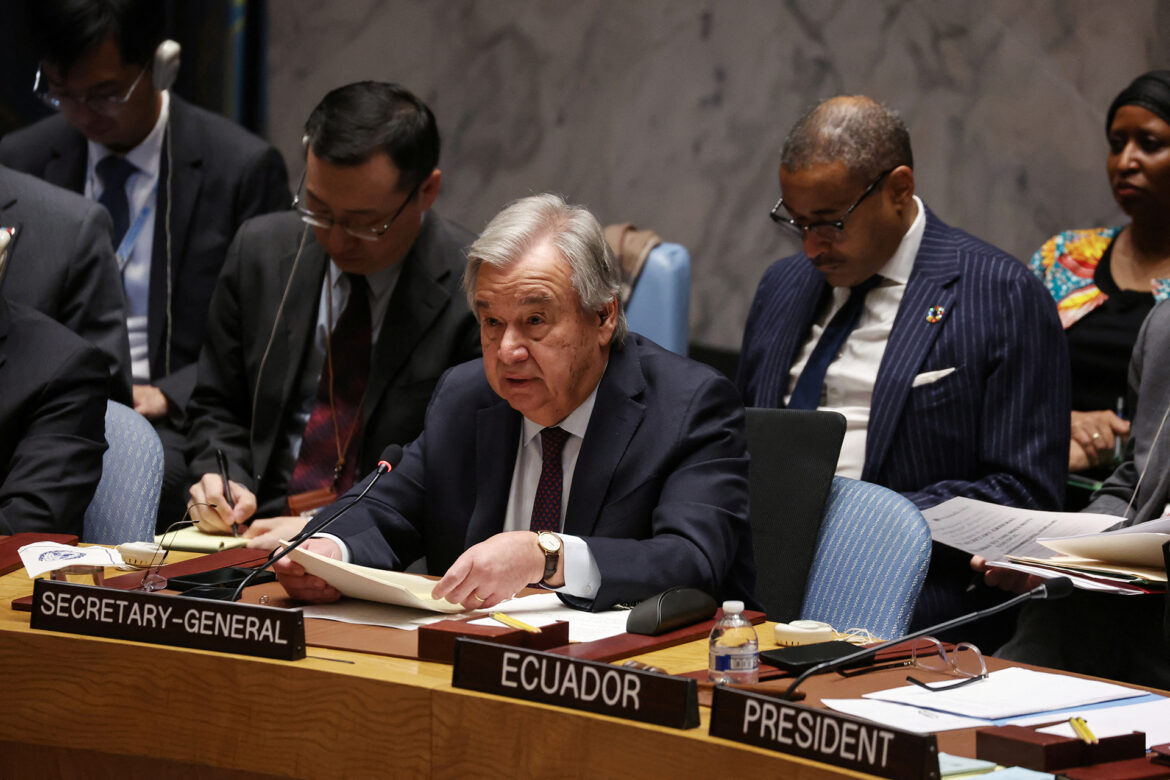8/12/2023–|Last updated: 12/8/202307:59 PM (Mecca time)
United Nations Secretary-General Antonio Guterres said on Friday that there is no effective protection for civilians in Gaza, and there is no safe place in the Strip, stressing that 85% of the population of the Gaza Strip were forced to leave their homes without the minimum necessities of life.
Guterres’s statements came hours before the United Nations Security Council voted on the demand for a humanitarian ceasefire in the war between the Palestinian resistance and Israel.
Guterres said that the United Nations is committed and committed to continuing to provide assistance to the residents of the Gaza Strip, but there are fears of a complete collapse of the humanitarian support system in Gaza, which will have dire consequences.
Guterres added that the health system in Gaza is collapsing while needs are escalating, and food for the people of Gaza is running out, and according to the World Food Program there is a serious risk of famine, and he stressed that the conditions necessary for the effective delivery of humanitarian aid to Gaza no longer exist.
He expected that the events in Gaza would lead to a complete collapse of public order, and increased pressure for mass exodus to Egypt, and stressed that the restrictions imposed by Israel in Gaza make it difficult for United Nations organizations to meet the needs of the population, which prompted him to write to the UN Security Council, citing Article 99 because we We have reached the breaking point.
He expressed his fear that the consequences of what is happening in Gaza will be devastating to the security of the entire region, and added, “We have already witnessed the spread of what is happening in Gaza to the occupied West Bank, Lebanon, Syria, Iraq and Yemen.”
He pointed out that more than 130 United Nations workers were killed, which is the largest loss of life in the history of the international organization, noting that the threat to United Nations employees in Gaza is unprecedented.
For his part, the Palestinian Permanent Representative to the United Nations, Riyad Mansour, said that Israel’s war on Gaza aims to end the Palestinian issue and eliminate peace, stressing that Israel is planning ethnic cleansing in Gaza, taking away the property of the Palestinian people and forcibly displacing them.
Riyad pointed out that Israel says that its war on Gaza aims to destroy Hamas, while 70% of the victims are civilians, stressing that Israel’s goal in the war on Gaza is clear, which is to force people to leave.
On the other hand, Israel’s representative to the United Nations, Gilad Erdan, considered that regional security would not be achieved except by eliminating Hamas, and he believed that this movement was responsible for terrorizing the Israelis and forcing the residents of Gaza to live in difficult conditions. He stressed that “Hamas is the root of the problem in the Gaza Strip, but its crimes are not discussed.”
For his part, Robert Wood, deputy US representative to the Security Council, considered that calls for an immediate ceasefire will only lead to sowing the seeds of the next war, noting that Washington seeks a future in which Hamas does not exist, stressing that it still poses a threat to Israel and remains Responsible for Gaza.
Dmitry Polyansky, Russian Deputy Representative to the United Nations, considered that the Security Council failed to take a binding resolution that includes demands for the parties to end the violence in Gaza, noting that the displacement of Palestinians aims to make them choose between leaving their homeland or death.

International session
The UN Security Council is scheduled to decide today, Friday, under pressure from the UN Secretary-General, on a call for an “immediate ceasefire for humanitarian reasons” in Gaza.
Guterres’ spokesman Stephane Dujarric commented, “We hope that the Security Council will take up his call,” noting that the Secretary-General has spoken since last Wednesday with US Secretary of State Anthony Blinken and British Secretary of State David Cameron, and with a number of Arab countries.
Last Wednesday, Guterres sent a letter to the Security Council in which he used Article 99 of the Charter of the United Nations, which allows him to “draw the attention” of the Council to a file that “could endanger international peace and security,” in the first activation of this article in decades, which angered Israel. .
He wrote in his letter, “With the continuous bombing of Israeli forces, and with no shelters or minimum survival rates, I expect an imminent complete collapse of public order due to desperate circumstances, which makes it impossible to (provide) humanitarian assistance, even if it is limited.”
He renewed his call for a humanitarian ceasefire to avoid “irreversible consequences for the Palestinians, and for peace and security in the region,” as he put it.
For 63 days, the Israeli occupation has continued its aggression against the Gaza Strip, which to date has left more than 17,000 martyrs, 46,000 injured, and massive destruction to residential neighborhoods, vital facilities, and hospitals.
The sector suffers from a shortage of food, water, fuel, and medicines, while 1.9 million people, or 85% of its population, have been displaced, amid devastation and damage that included half of its homes.
Following Guterres’s unprecedented message, the United Arab Emirates prepared a draft resolution to be put to a vote in the Security Council today, Friday, according to what the Ecuadorian presidency of the Council reported.
In its latest version, the draft resolution calls for an “immediate ceasefire for humanitarian reasons” in Gaza, warning of the “catastrophic humanitarian situation in the Gaza Strip.”
The brief text also calls for “the protection of civilians,” “the immediate and unconditional release of all hostages,” and “ensuring humanitarian access.”



